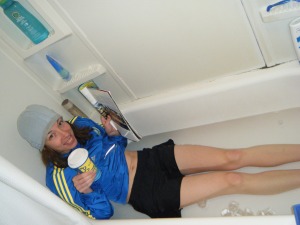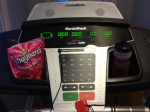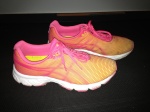Like me, I’m sure that most first-time expectant parents think about what it will be like to be a parent. Will you be a good parent? How hard is it going to be? By what margin will the joy outweigh the hard days?
I’ve worked with youth for my entire almost 10 year nursing career; the last 4 years in more of a counseling role with teenagers. I’ve learned a lot about what makes a good parent. Actually, that’s not true. I’ve learned the most about what makes a poor parent. Some key parenting things, or rather the absence of some key parenting things seems to make a difference. In my observation, in no particular order these “things” are:
- Meals together
- Food in the house for school lunches
- Transportation to sports and extracurricular events
- Attendance and support at sports and extracurricular events
- Fair rules that are enforced, including a curfew and prohibition of romantic partner sleepovers
- Active interest in the youth’s peer group
- Active interest in homework and study completion
- Avoidance of full blown parental conflict in front of kids
- Consistent demonstration the kid is more important than the internet, facebook, tv etc.
I was lucky to have all of these things growing up (thanks Mom and Dad). This is a short and non-comprehensive list. And it’s for teenagers. My child won’t be a teenager for more than a decade.

with 6 year old Lamin "More Fire" Suso
Can Running Help?
I’ve been thinking about this question, will I be a good parent, in context of being a runner. I think that there may be some parallels between being a good runner and being a good parent. Perhaps some aspects of being a good runner will help me become a good parent. Some of the lessons I’ve learned from running may help me in this next chapter of my life. Maybe I’m onto something. Or maybe not. But here goes.
Related Concept #1: Runners Run. Parents Parent.
The end.
Just joking.
Here is what I think related to this. I’ve begun many training cycles with competitive goals: 3 consecutive Boston Marathons, shorter fall races, the distance of a hot African country. In the midst of a training cycle, with a competitive goal loaming, you run; you train; you perform track workouts that you do not enjoy because your coach says to; you do your strength exercises even though you hate them; you work your butt off literally and figuratively and eat a foolish number of calories to maintain a competitive butt weight.

The Ice Bath: no one really wants to do this
You sacrifice things in the midst of a hard training cycle. You pass on that second glass of wine. You choose bed instead of a late movie with your friends. You give up a relaxing weekend morning to run 2-2.5 hours every weekend for 16-18 weeks. You don’t eat bacon and eggs for breakfast. You are late for supper with your partner because you at the track busting out 10 x 1km with your training partners because you can’t do that workout alone.
You run in a different way than you do when you are running for yourself, for fun, without a competitive goal. With a competitive goal, you’ll wake up on a Wednesday at 6am. You have a 10km recovery run to do before work just like every other Wednesday. It’s raining. Or snowing. You do not want to run. You want to roll over in your warm bed and sleep until 7am. But you get yourself out of bed and you run anyway. Your weekly mileage total depends on this easy run. Your performance at the track the next day depends on this easy run, on its recovering nature.
A runner runs, even when she doesn’t want to.
You do all of this because that’s what it takes to achieve success.
And because a runner runs even when she doesn’t want to.
This is the trait that might help me parent my child. I have a long history of doing things, hard things, hard runs, that I don’t always want to do. But I do them anyway, with minimal complaint, in the greater pursuit of success. I’m sure that there will be moments when I don’t really want to do child-rearing activity ‘x.’ But I know that I’ll be able to do it, with minimal complaint.
A parent parents, even when she doesn’t want to.
Related Concept #2: No hard work, no pay off.
Awesome kids don’t grow themselves. Awesome personal bests don’t set themselves. Both require a lot of hard work.
I didn’t make it 424km across a hot African country by sitting on the couch. I made it by training and running 6 days a week for 7months. Hard work was how I made my dream of running clear across The Gambia possible. Hard work is how I set my racing personal bests.
I’ve been both a 4:05 marathoner and a 3:18 marathoner. I’ve been both a 2:06 half marathoner and a 1:33 half marathoner. The biggest difference between these two versions of myself? Hard work. Dedication to my training. Running when I don’t feel like running because that’s what runners do.
Maybe putting in the hard work for the future pay off applies to raising a child. You can’t just sit on the couch hoping or waiting for a child to become a good, successful and well-adjusted child. You invest in your child, you put in the hard work of parenting and you give them the best chance possible to be successful.
Related Concept #3: Limits of the human body

Winter 2011
The human body was born to run. It was born to run in the heat. It was born to run in the snow. It was born to run long distances.
I know these facts to be true as I’ve lived their truth pounding the pavement for many years.
The human body was also born to deliver babies and to care for babies. I’ve brushed against the limits of the human body many times with sneakers on my feet and stretches of road ahead of me. I’ve developed a lot of mental and physical strength over my many years of running. I feel like this is the evidence that I need to know and believe that my body can deliver this baby. My body can handle the sleep deprivation of caring for an infant.
Many people have asked me how I feel about giving birth. People began asking me, as early as the day that I announced my pregnancy, if I had a birth plan? Some want to know if I’ll opt to use drugs or if I’ll go for a natural birth. Most of these people are “ladies” (read more here).
I always give them a vague answer, indicating that I haven’t thought it through, haven’t made a “birth plan” (whatever that is) but that I feel like I’ll be quite ok in labour. Many of these people look at me skeptically. I try to explain that I’ve been a distance runner for many years, I feel like it’s been good preparation for childbirth. The skeptical look remains. Sometimes they are outright dismissive of my assertion that I think that I can deal with labour because I’ve dealt with the pain of late miles in a marathon; with the evil voice that tries to make you stop running; that I am so familiar with pain that I can differentiate fatigue based pain from hardwork and pain from cellular damage
Only one beautiful soul spared me from skepticism. My friend and colleague Melanie Breen, a mother of two, wanted to talk a little bit about childbirth. “You are going to be really good at this,” Melanie told me. “All of your running, your yoga, your mental strength and experience is going to serve you so well.”
I said nothing for a few long seconds and then responded, “You are the first person who had said that to me. I keep trying to tell other people that.” Then she hugged me. And I felt good.
Related Concept #4: Hope and belief in something that’s really flimsy
Success in running and racing is flimsy. That’s the word I like for this: flimsy.
A runner can have the best possible training cycle under the best coach with very few missed days for injury and lots of confidence and belief in themself. And then they can still flop on race day. I know, this happened to me this year at Boston Marathon.
Near perfect training. Healthy body. Healthy mind. Super husband, on the course to cheer for me. Super coach, on the course to cheer for my team and I. My coach was fully confident that I was ready to run 3:10. I was fully confident. The weather was perfect. The wind was at my back. It should have been my day. Then the race began and I mentally blew up and blew my goal. You can read more in the race recap I wrote the following day here.
Even with near-perfect conditions in both training and on race day, the race itself has no guarantees. More things can go wrong than can go right. There is no guarantee that if you do “all of these things” then you will run 3:10. Or whatever your race goal is. It’s flimsy.
But you do it anyway, knowing the risk of failure is present. You choose to believe in yourself, over and over, and you tie up your shoes and toe the line again because you believe that one of those times, it is going to be your day. And you’ll miss it if you don’t accept the risk of failure and get out there and try.
This requires a strong foundation of belief in yourself. I made it across a country in running shoes with this belief. Before I set off from that farm field in Senegal, I knew that some people thought that I would never make it. Some of these people told me before my run began; some admitted it to me after. But the thing was, it didn’t matter what they thought or what they believed. I made it to the Atlantic Ocean 424km later only because I believed that I could do it. My belief was the only one that mattered.

My friend Kecouta Sonko's baby girl Awa in Senegal
Maybe this acceptance of risk and failure and belief in yourself helps with parenting. Maybe you do the best you can, believe in yourself as much as you can and give it your best shot while understanding that there are tons of other variables at work making your end goal- a race PB, a happy, healthy, well-adjusted child- flimsy. As a parent-to-be, if you don’t take a risk and chose to do it, you probably miss out on something really great; something way better than a race PB.
At the end of the day
That’s all I have. Four loosely related traits that I’ve grown throughout my running career that may serve me as I make the plunge into parenthood. We’ll be first time parents. We will learn. My husband and I are a strong team. This baby was planned and we love this kid a lot already. These must count for something.
I’m terribly sensitive to unsolicited advice, but feel free to let me know what you think.








